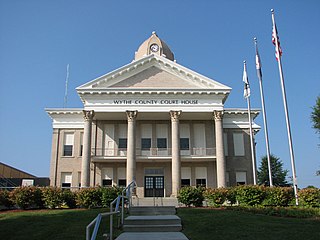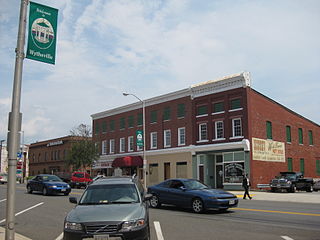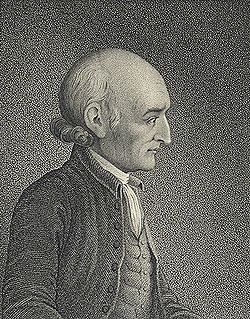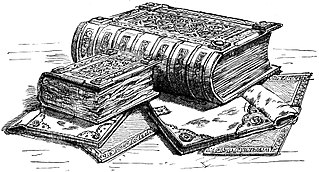Related Research Articles

Wythe County is a county located in the U.S. state of Virginia. As of the 2010 census, the population was 29,235. Its county seat is Wytheville.

Wytheville is a town in, and the county seat of, Wythe County, in western Virginia, United States. It is named after George Wythe, a signer of the United States Declaration of Independence, and mentor to Thomas Jefferson. Wytheville's population was 8,211 at the 2010 census. Interstate Highways 77 and 81 were constructed to intersect at the town, long a crossroads for travelers.

George Wythe was the first American law professor, a noted classics scholar, and a Virginia judge. The first of the seven Virginia signatories of the United States Declaration of Independence, Wythe served as one of Virginia's representatives to the Continental Congress and the Philadelphia Convention. Wythe taught and was a mentor to Thomas Jefferson, John Marshall, Henry Clay and other men who became American leaders.

Elbert Lee Trinkle was an American politician who served as the 49th Governor of Virginia from 1922 to 1926.
Stephen Trigg was an American pioneer and soldier from Virginia. He was killed ten months after the surrender of Cornwallis at Yorktown in one of the last battles of the American Revolution while leading the Lincoln County militia at the Battle of Blue Licks, Kentucky.

A county surveyor is a public official in the United States and the United Kingdom.
The Great Wagon Road was an improved trail through the Great Appalachian Valley from Pennsylvania to North Carolina, and from there to Georgia in colonial America.

Whiskey Hill is a historic house in Taylorstown, Virginia. The house was added as a contributing property to the Taylorstown Historic District in 2004 when the district was expanded to include it and several neighboring structures.

William Terry was a nineteenth-century politician, lawyer, teacher, and soldier from Virginia and the last commander of the famed Stonewall Brigade during the American Civil War.
Joseph Crockett Shaffer was a U.S. Representative from Virginia.
George Bowman (1699–1768) was an 18th-century American pioneer, landowner and a prominent Indian fighter in the early history of the Virginia Colony. He, along with his father-in-law Jost Hite, was one of the first to explore and settle Shenandoah Valley. His estate, on which Fort Bowman was founded, was one of the earliest homes to be built in Shenandoah Valley and is the site of present-day Strasburg, Virginia.

Toliver Craig Sr. was an 18th-century American frontiersman and militia officer. An early settler and landowner near present-day Lexington, Kentucky, he was one of the defenders of the early fort of Bryan Station during the American Revolutionary War. It was attacked by the British and Shawnee on August 15, 1782.

Botetourt Springs is a mineral spring and was a historical settlement on the border of Roanoke County, Virginia and Botetourt County, Virginia, United States. The spring is located 12 mi (19 km) from Fincastle. Botetourt Springs was originally settled in the mid-18th century, growing as a mineral spring resort during the summer, especially after the 1820s.

Fort Chiswell Site is a historic archaeological site located at Fort Chiswell, Wythe County, Virginia. It is the site of a frontier fort built in 1758 as an outpost during the French and Indian War. The fort was situated at the junction of the Great Trading Path and the Richmond Road, near the New River. The fort fell into disrepair in the 18th century as both the county seat and courthouse were moved from Fort Chiswell to the county seat of Wytheville, 12 miles to the west. The remaining foundations of the Fort and its surrounding buildings were completely covered over during the construction of I-77 in Wythe County during the 1970s. There is a pyramid shaped historical marker of sandstone situated approximately 200 yards west-northwest of the fort's original location next to the old chicken house.
John Mathews was an early American pioneer, militia officer, and ecclesiastic official in the present-day U.S. state of Virginia. Likely born in Ireland, Mathews was among the first residents of Augusta County, Virginia. He was an officer in the county militia, which fought in Braddock's Expedition of the French and Indian War, and he served as a justice, vestryman and de facto public officer for the county, tending to local religious, administrative and infrastructural needs. In the year of his death, he was serving as a churchwarden.
Raymond Arthur Byrd was born April 2, 1895 in Speedwell, Wythe County, Virginia to Stephen and Josephine Sheffey Byrd. Byrd was the second of four children born in the family. He was an African-American farmhand living in the Black Lick district of Wythe County, Virginia, accused of rape and subsequently lynched by a mob on August 15, 1926. Byrd was kidnapped from the Wytheville jail by a mob of masked men, shot, bludgeoned, and dragged several miles before being hung from a tree branch. Byrd's lynching became the subject of national news and prompted anti-lynching legislation to be signed into law by Governor Harry F. Byrd of Virginia in 1928. The only man indicted by a Grand Jury for the lynching, Floyd Willard, was acquitted after only ten minutes of deliberation during the trial on July 19, 1927.
The Carolina Road or the "Old Carolina Road" are names for various sections of the Great Wagon Road and other routes in colonial America. "The 'Old Carolina Road', extending from Lancaster, Pennsylvania to the Yadkin Valley, was one of the most heavily traveled roads in eighteenth century America." Parts of the 180 mile long Journey Through Hallowed Ground National Heritage Area scenic byway follows the Old Carolina Road through Pennsylvania, Maryland and Virginia.

The Wytheville Raid or Toland's Raid was an attack by an undersized Union brigade on a Confederate town during the American Civil War. Union Colonel John Toland led a brigade of over 800 men against a Confederate force of about 130 soldiers and 120 civilians. The location of Wytheville, the county seat of Wythe County in southwestern Virginia, had strategic importance because of a nearby lead mine and the railroad that served it. This mine supplied lead for about one third of the Confederate Army's munitions, while the Virginia & Tennessee Railroad transported Confederate troops and supplies; plus telegraph wires along the railroad line were vital for communications. In addition to logistics of moving the lead to bullet manufacturing facilities, this rail line also connected an important salt works of an adjacent county with the wider Confederacy.
Abner Wentworth Clopton Nowlin was a farmer, Confederate officer, politician, editor and lawyer from Virginia, who spent the final years of his life assisting fellow veterans and others at the Central Union Mission in Washington, D.C.
Kegley may refer to:
References
- ↑ Richard Lee Morton Virginia lives: the Old Dominion who's who 1964 "KEGLEY, FREDERICK BITTLE, agricultural leader and educator, Rose Hill Farm, Wythevllle.
- 1 2 "F.B. Kegley". Kegley Library. Retrieved 12 April 2015.
- ↑ John Allen Neal Bicentennial history of Washington County, Virginia, 1776-1976 1977 "Frederick Bittle Kegley 1877-1968 : Frederick Bittle Kegley was born on the old home farm, July seven, at the foot of historic Old Queen's .."
- ↑ Wythe County historical review: Issues 27-42 Wythe County Historical Society - 1985 TOLAND'S RAID Among the papers of the late FB Kegley, Wythe County historian, was this brief account of the Civil War raid on Wytheville by Union cavalrymen under Col..."